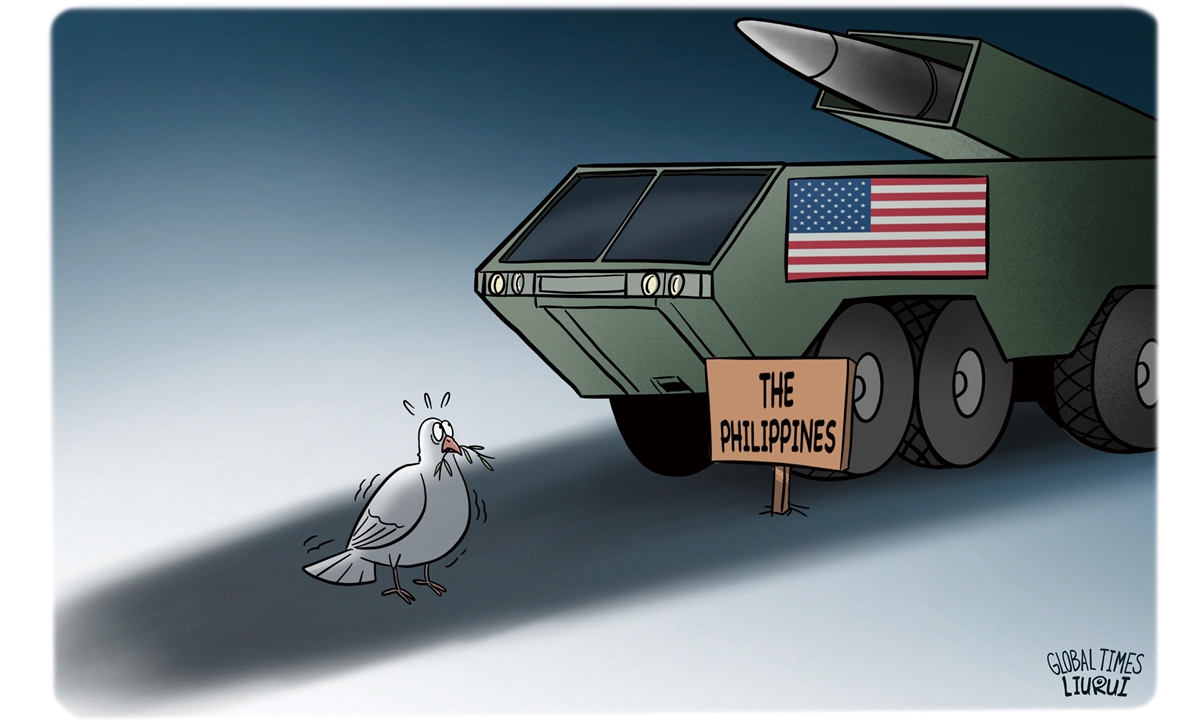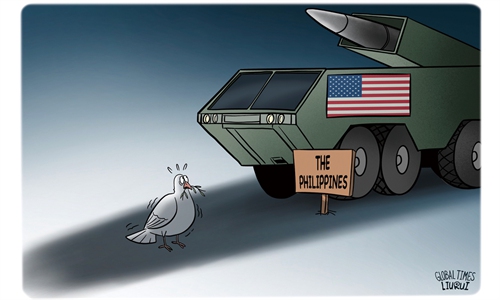US deployment of ‘Typhon’ in Asia-Pacific threatens to disrupt regional stability

Illustration:Liu Rui/GT
In November 2024, the Philippines claimed that it was considering purchasing the "Typhon" intermediate-range capability missile system from the US, which was temporarily stationed in the Philippines for the alleged purpose of military exercises. This is a significant development in the US' push to deploy the "Typhon" system across the world since its withdrawal from the Intermediate-Range Nuclear Forces (INF) Treaty in 2019. It will undermine security and cooperation in the Asia-Pacific region and should alarm regional countries.The US has long been planning to deploy 'Typhon' in Asia-Pacific
In one of its most notorious withdrawals from international treaties, the US abandoned the INF Treaty in 2019, essentially giving itself a free pass to develop and deploy ground-based intermediate-range missiles (GBIRM) with a range of 500 to 5,500 km. Multiple reports released by RAND Corporation and other American think tanks in recent years show that the US has been eyeing new deployment locations, which include allies in the Asia-Pacific and Europe.
In April 2024, the US took advantage of the joint military drills to ship the "Typhon" system to the Philippines and continued to keep the system there long after the drills ended. Then, Manila expressed its interest in owning the system.
The Philippines is only one of multiple locations in the US' deployment plan. In August 2024, Secretary of the US Army Christine Wormuth expressed a desire to deploy intermediate-range missiles in Japan during a visit to Tokyo to strengthen their "deterrence against China."
The US also announced plans to deploy long-range missile systems in Germany in 2026, including SM-6 air defense missiles, Tomahawk cruise missiles and hypersonic weapons, to enhance NATO's defense capabilities. The ranges of these weapons far exceed those of existing land-based missiles in Europe. Russia has made clear that it will respond militarily, which may include the deployment of nuclear missiles in Kaliningrad. These threatened moves, if materialized, could upset the existing strategic balance and increase the risk of miscalculation and confli
Although the US has broken free from the INF Treaty, it contravenes other multilateral agreements with the deployment of "Typhon," such as the Missile Technology Control Regime (MTCR). And this may lead to the proliferation of weapons of mass destruction (WMDs). The MTCR, developed by the US and other Western countries, prohibits the export of tactical missiles with a payload of more than 500 kg and a range of more than 300 km.
The "Typhon" system could carry Tomahawk cruise missiles and SM-6 missiles, which have much longer ranges than those allowed under the MTCR. Deploying it would also push up the risk of proliferation of WMDs, including biological, chemical and nuclear weapons. The US claims it is doing so to safeguard the security of its allies. However, in reality, what the US is really doing is preserving its own hegemony by pursuing global deployment of missile systems with mid-range capabilities, disregarding international rules and legal bounds. This will undoubtedly intensify confrontation and cause more volatility in the global security landscape.
Security of Asia-Pacific becomes a victim of US Indo-Pacific Strategy
When the US first shipped the "Typhon" system to the Philippines in April, it chose to deploy it in northern Luzon. The island is only 400 km away from the Taiwan Straits, while Tomahawk missiles have a range of up to more than 2,000 km, capable of covering the South China Sea. This is not defensive deterrence, but offensive provocation that further complicates the regional situation.
Apart from that, shortly after Manila announced in November its plan to discuss the purchase of "Typhon," the US and the Philippines signed the General Security of Military Information Agreement (GSMIA), which allows the US to provide the Philippines with more advanced and sophisticated weapons. Such a move could make other Asia-Pacific countries feel insecure and prompt them to seek procurement of advanced weapons. The result would only be an intensifying regional arms race and an even more complex military landscape in Southeast Asia and the Western Pacific.
Analysts have pointed out that the Asia-Pacific came first in the US missile deployment plan after its withdrawal from the INF Treaty, likely for the purpose of tilting the regional dynamics in its favor by provoking an arms race and making Asia-Pacific countries more dependent on its "military protection." Such an arms race would mean the US could profit from arms sales to these countries and even extract more economic and political concessions from allies. This will have a far-reaching negative impact on regional security and diminish the strategic independence of Asia-Pacific countries, especially Southeast Asian countries.
China's response to this development is clear: It firmly opposes the US deploying intermediate-range missiles in the Asia-Pacific and urges the US to stop provoking military confrontation and undermining regional peace and stability. Manila's plan to bring in the mid-range capability missile system, a strategic and offensive weapon, is an extremely irresponsible decision for the people of the Philippines and other Southeast Asian countries as well as for regional security.
Manila acting as a US pawn hinders regional unity and development
Since President Ferdinand Marcos Jr came to power, the Philippines has become a vanguard of advancing the US' strategy for the Asia-Pacific. Washington and Manila have also been trying to link the Taiwan question with the South China Sea issue. The Philippine government officials claim that the deployment of "Typhon" is aimed at modernizing the country's military capabilities and strengthening deterrence. However, the Philippines does not have the ability to operate the "Typhon" system alone and needs to rely heavily on the US. This means it will eventually become a tool of the US and fall into a security dilemma where its actions for the ostensible purpose of bolstering security will only lead to greater insecurity.
The unwise move of the Marcos administration has been widely criticized by clear-minded people in the Philippines. Imee Marcos, sister of Marcos Jr and chairperson of the Senate Committee on Foreign Relations, has openly denounced the adventurous moves of the Marcos administration for making the Filipino people a target and calls for an independent policy. Some Filipino intellectuals also warn that the actions of the Marcos administration are more likely to serve the US agenda and that the Philippines should seriously consider how to avoid being dragged into a "new Cuban missile crisis."
The other Southeast Asian countries are also against Manila's move. During the authors' research trips to Southeast Asia, many local scholars shook their heads when talking about the Philippines. They see the Philippines as an "outlier" now among Southeast Asian countries because the Marcos administration's repeated provocations in the South China Sea run counter to the spirit of the Treaty of Amity and Cooperation in Southeast Asia and the "ASEAN way." Under the pretense of defending "sovereignty" in the South China Sea, the Philippines has signed military agreements with the US, Japan, Australia and even EU countries and held various combinations of military exercises, inviting external forces to the region. This has undermined ASEAN unity as well as centrality and hindered ASEAN's effort to keep the focus on regional economic cooperation and development.
With the Trump 2.0 era just around the corner, the US is expected to shift back to the unilateralist "America First" policy, and the world is eager to know whether the US will again demand more military spending from its allies while imposing additional tariffs on them. Having this in mind, many countries in the region are adjusting their strategies and preparing for what may come. If Manila still stubbornly ties itself to the US agenda, it will only bring volatility and insecurity to itself and the region. It is time for the Marcos administration to heed the voice of the people and appeals of other regional countries and stop its dangerous, self-defeating maneuvers. If it doesn't, it could become an expendable pawn of someone else.
Zhang Jie is a researcher at the Institute of Asia-Pacific and Global Strategy at the Chinese Academy of Social Sciences (CASS). Cao Xiaoyang is an associate researcher at the Institute of Asia-Pacific and Global Strategy at CASS. opinion@globaltimes.com.cn

